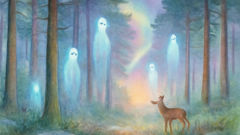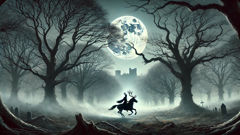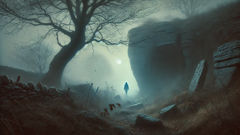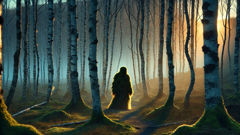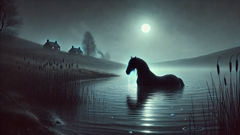Introduction
Across the endless sweep of Siberia, where pine and larch stand guard over deep, snow-veiled valleys and the sky is a shifting mosaic of blue and rose-gold, there echoes a legend as old as the forest itself. The wind through the taiga carries stories of the Urmane—gentle, enigmatic spirits said to dwell beneath ancient roots, behind shrouds of mist, and among the hidden paths animals know by heart. To those who respect the land, the Urmane reveal themselves in flickers of moonlight on frost, in the soft tread of lynx, or in the hush that falls when the forest listens. For generations, tales of the Urmane have been whispered by firelight in remote villages and reindeer camps, their presence woven into lullabies and hunting songs. They are the guardians of balance: protectors of beasts and birds, and the unseen guides for lost or desperate hunters. In Siberian folklore, to cross into their domain is to step into a realm where human and animal destinies are braided together by compassion and wisdom. Those who would harm without need or wander carelessly may vanish, only to return with changed hearts—or not at all. Yet, for those who heed the pulse of the land, the Urmane offer protection, guidance, and rare glimpses into mysteries that bind all living things. This is the story of the Urmane, and of how their gentle touch shaped the fate of a hunter, a wild stag, and an entire village beneath the shadowed pines.
Whispers Beneath the Pines
For as long as the village of Tyumene could remember, the forest was alive with secrets. The elders spoke of the Urmane as beings older than language, born from the sighs of wind and the quiet thrum of the earth. They were said to appear most often to children, the lost, and those whose hearts ached with longing—be it for love, for home, or for forgiveness. Some described the Urmane as shimmering forms, half-shadow, half-light, with eyes that held the green of moss and the blue of rivers. Others believed they took the shapes of animals: a wolf with silver fur, a lynx whose eyes sparkled with ancient knowledge, an owl whose wings carried the weight of centuries. Their true form was the spirit of the forest itself, ever-changing, eternal.
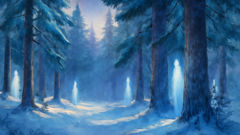
In the long months when the snow lay thick and silence pressed against windowpanes, villagers left offerings for the Urmane: a piece of fresh bread, a tuft of reindeer hair, a handful of cloudberries from the last thaw. Hunters carried charms carved from birch or antler, and before venturing beneath the boughs, they whispered a promise: to hunt only for need, to take no more than the forest could spare. For it was well known that those who broke this covenant risked more than misfortune—they risked the disfavor of the Urmane, whose retribution was subtle but unyielding. Tools dulled inexplicably, trails led in circles, and animals vanished like smoke at the first crackle of footsteps.
Young Mikhail, son of the village blacksmith, had heard these stories since childhood. He grew up listening to his grandmother’s voice, crackling and warm as fire, telling of times when the Urmane saved a lost child or led a starving wolf to a wounded elk. Mikhail believed, as many did, that the Urmane watched him. Sometimes, late at night, he thought he glimpsed their pale glow moving between the trees, or heard laughter in the wind’s whistling. Yet he’d never seen one up close—until the winter the great famine arrived.
That year, the snows began early and fell without mercy. The river froze solid, the herds drifted south, and the stores in Tyumene dwindled fast. Hunger became a constant companion. The elders prayed, children grew thin, and even the bravest hunters returned empty-handed. It was during these desperate days that Mikhail’s resolve was tested. He set out before dawn, bundled in furs, his breath curling in silver ribbons as he entered the forest alone. With every step, the world felt emptier—no birds sang, no tracks marked the snow. Yet somewhere beyond the reach of sight, the Urmane waited, watching.
The Stag with Silver Antlers
Hours slipped by as Mikhail followed fading trails. Hunger gnawed at his insides, but he pressed on, driven by the memory of his mother’s tired smile and the hope of returning with food. He moved quietly, every sense alert for any sign of movement in the white stillness. At last, near a clearing where the sunlight filtered in pale gold, he spotted tracks—fresh, sharp-edged in the snow. They were unlike any he’d seen before: larger than a wolf’s, yet too delicate for a bear. Curiosity drew him on.
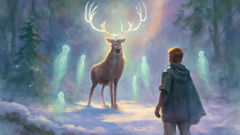
At the heart of the clearing stood a stag, magnificent and otherworldly, its coat shimmering with a faint silvery hue. Its antlers glittered as if traced by moonlight, rising in spirals that defied natural form. The stag turned to face Mikhail, its eyes dark and knowing. For a moment, boy and beast regarded each other in perfect stillness. Something deep within Mikhail’s heart stirred—an old memory or perhaps a dream. He lifted his bow with trembling hands, not out of malice, but out of desperate need.
Before he could nock an arrow, the stag spoke—not in words, but in a language woven from wind and longing. Images flashed across Mikhail’s mind: the warmth of his home, the laughter of his little sister, the face of his grandmother as she sang by the stove. He saw, too, the devastation wrought by overhunting—fields stripped bare, wolf packs starving, and the delicate balance of the taiga shattered. He lowered his bow, tears freezing on his cheeks. In that moment, the Urmane revealed themselves in full: forms rippling into existence around the stag, their bodies woven from mist and dawn light. They circled Mikhail, not threatening but curious and gentle.
The largest Urmane stepped forward, its voice echoing like a stream over pebbles. “You seek life, young hunter, not death. Your heart remembers the old promise.” Mikhail nodded, unable to speak. The Urmane touched his shoulder, and a warmth flooded through him—soothing, nourishing, more real than any food. The spirits led him through a maze of trees, their glowing forms illuminating hidden paths. As they traveled, Mikhail saw animals he’d never noticed: a sable curled beneath roots, a family of hares darting under snow-laden branches, birds singing quietly in the cold. The forest was alive, pulsing with unseen magic.
The Urmane guided Mikhail to a fallen birch where mushrooms grew in abundance and revealed a nest of wild eggs sheltered from frost. “Take only what you need,” they said. Mikhail gathered food with gratitude, careful not to disturb more than he must. As dusk fell and the stars awoke, the Urmane vanished like breath on glass, leaving only the faintest shimmer in the air. Mikhail turned for home, his burden light but his spirit full. That night, the famine eased in Tyumene—not because of what Mikhail brought, but because he shared what he’d learned: reverence for the forest and the invisible threads that bound every creature together.
The Hunter’s Journey and the Gift of Balance
Winter dragged on with relentless cold, but the hearts of Tyumene grew lighter. Mikhail’s tale spread through the village like the promise of thaw. Children listened wide-eyed as he described the Urmane and the silver stag, and elders nodded with recognition and pride. For a time, the village flourished: hunters took only what they needed; herders left some berries for birds; even the youngest learned to carve simple charms of birch in gratitude for unseen blessings.
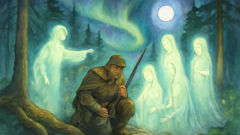
Yet, not all listened with reverence. Pavel, a hardened trapper known for his skepticism and greed, scoffed at Mikhail’s story. He had lost much to the winter—traps snapped empty, snares vanished under snow. Anger grew in him like rot. One night, under a sky spangled with northern lights, Pavel set out with an iron resolve to outsmart both beast and spirit. He brought no charm, left no offering, and muttered curses at the forest’s shadows.
The deeper he pushed into the taiga, the quieter it became. Snow muffled his steps; the trees seemed to lean inward, closing off all paths but one. Hours passed, and Pavel found himself hopelessly lost. Hunger gnawed at his belly, but pride would not let him turn back. Suddenly, from behind a curtain of low branches, a pair of eyes glowed—neither animal nor wholly human. The Urmane emerged from the gloom, their presence both chilling and strangely tender.
They offered Pavel a choice: “Return with humility and you will find your way. Persist with greed and you will wander until your heart remembers.” Pavel scoffed again, refusing to believe. He stumbled onward, but every landmark shifted, every trail circled back to its start. Days blurred together in a haze of exhaustion and fear. At last, when hunger overcame pride, he collapsed beneath a tree and wept—not from weakness, but from the realization of his own smallness within the vastness of the world.
Moved by his surrender, the Urmane approached him once more. This time, their touch was soft as falling snow. Visions flooded Pavel’s mind: the joy of a fox reunited with her kits, the hope in a child’s laughter, the strength drawn from giving rather than taking. When he awoke, he was near the edge of the forest, his pockets empty but his heart changed. He limped back to Tyumene, where he shared his own tale—not of conquest, but of humility and renewal. The village listened and learned.
In the seasons that followed, Tyumene prospered. Forest and village existed in harmony; animals returned in abundance, wildflowers bloomed where old wounds had healed. The Urmane watched from the shadows, content that their lesson had been understood. Mikhail grew into a wise leader, always remembering the stag with silver antlers and the warmth that had saved him. And though few ever saw the Urmane again, their presence lingered—in every song sung to children, every offering left beneath the pines, and every act of kindness done in the heart of the taiga.
Conclusion
The legend of the Urmane endures because it speaks to something universal—the longing for harmony between humankind and nature. In Siberia’s ancient forests, where silence can be both comfort and warning, people still honor the old ways: leaving offerings at the edge of the woods, teaching children to tread lightly and listen well. The Urmane remain unseen by most, but their influence weaves through every act of kindness and respect shown to the land. For those who pause to notice—the rustle in the undergrowth, the sudden hush at dusk—there is always a sense that someone is watching, guiding, and gently shaping fate. The tale of Mikhail, the stag with silver antlers, and even hard-hearted Pavel becomes more than myth. It is a living reminder that compassion, humility, and gratitude are the true paths home. And so, under the shadow of ancient pines and the dance of auroras, the Urmane’s gentle wisdom continues to echo: protect what you love, take only what you need, and trust that you are never truly alone in the vast and wondrous taiga.

